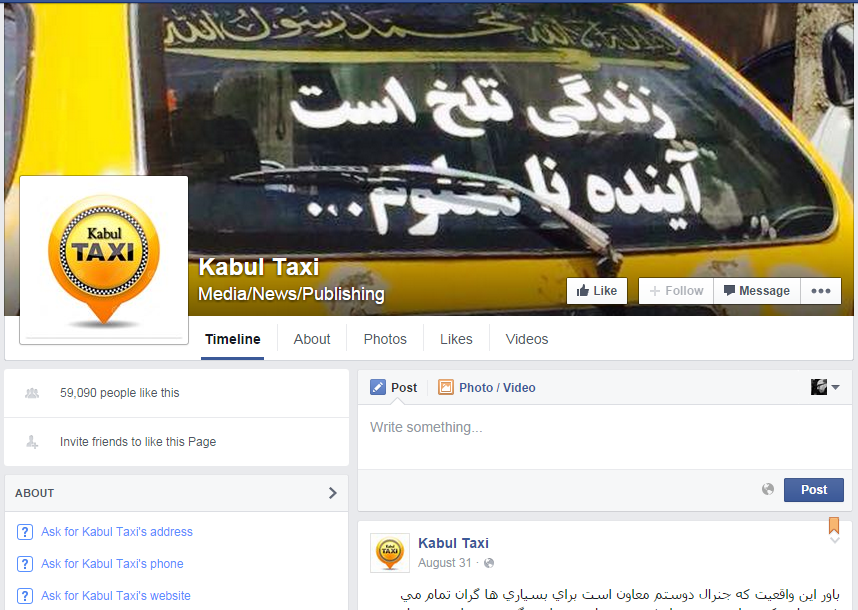The minister who got in a 'Kabul Taxi'
- Published

The original Kabul Taxi. The writing in the window reads: “Life is very hard and the future is uncertain.”
A minister hails a taxi and 27 of his closest friends want to pile in the back. Why? Well since they're his friends and have just been appointed to plum government posts, they now think they're entitled to go everywhere he goes.
That's the crux of just one of the satirical stories that has played out on the Facebook page Kabul Taxi, which has become a must-read for politicians and journalists in Afghanistan. And although the "taxi" was put out of commission for nearly a month when the page was taken down, it has spawned a whole fleet of imitators, and is now back online.
Kabul Taxi began service earlier this year and has more than 60,000 likes on Facebook. The premise of the fictional (though pointedly political) page is that a taxi driver plying his trade on the streets of Kabul frequently picks up powerful passengers, and reprints the conversations he has with them.
"Kabul Taxi is the first satirical Facebook page in Afghanistan," says Abdullah Khenjani, a journalist and TV presenter based in Kabul. "The idea is that you can criticise people who you could never normally criticise in other media."
The page has taken aim at politicians of all stripes including President Mohammad Ashraf Ghani and Abdullah Abdullah, his partner in Afghanistan's national unity government. Nobody has yet found out the identity of the driver - er, moderator - though the Washington Post reported he was 31 years old and most likely a member of the ethnic Hazara minority (he didn't reply to inquiries from BBC Trending).

Listen to BBC Trending Radio
Hear more on this story - and more from the Trending team - on BBC World Service radio. Stream the programme or download our podcast.

The page irritated Afghan officials, and several journalists were questioned, but not charged, before the page was taken offline. It's not clear why it was temporarily unavailable - whether taken down by the person behind it, or temporarily blocked by Facebook due to the volume of complaints (the company does not comment on individual pages).
Even while it was offline, though, a whole fleet of imitators sprung up in Kabul Taxi's place. One, Kabol Taxi, became even more popular than the original. Then, last week, the original page came back online.
"Not only are there other Kabul Taxis, there's Kabul Bus, and perhaps Kabul Jet will start up soon," Khenjani says. "People are frustrated by security, the economy, corruption, government inefficiency and lack of jobs… people are finding a way to tell their stories and share their complaints."
Blog by Mike Wendling
Next story: The teenage boy who lived, became famous, and was memorialised online

The death of a young YouTube star was mourned by thousands of his fans - so what drives people to share their entire lives online?READ MORE
You can follow BBC Trending on Twitter @BBCtrending, external, and find us on Facebook, external. All our stories are at bbc.com/trending.